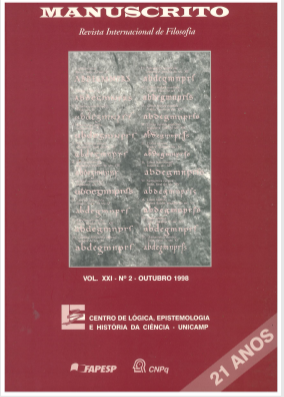Resumo
This paper assesses the research program of evolutionary epistemology for the contexto of discovery of scientific theories. It begins by stating the basic premises of this program, and it points out its Darwinist commitments. Then, it argues that a process of blind variation and selective retention is unable to account for scientific discovery. Epistemic variation is always directed to solve a well-defined problem, and this fact has no anologues in organic variation. The conception of heuristic rules as a sort of biological preadaplation is not suficiente to guarantee that discovery is not a random achievement. In fact, evolutionary epistemology rules out all heuristics that make use of trial and error stategies.
Referências
Campbell, D.T. (1974a). Evolucionary Epistemology, en: Schilpp, P.A. (ed.) The Philosophy of Karl Popper (La Salle, Open Court), pp. 413-463.
Campbell, D.T. (1974b). Unjustified Variation and Selective Retention in Scientific Discovery, en: Ayala, F.J. y Dobzhansky, Th. (eds.), Studies in the Philosophy of Biology (London, Macmillan), pp. 139-161.
Cassini, A. (1996). Ensayo y error restringido y orientado, Esquema de uma lógica del descubrimento cientifico, en: Análisis Filósofico. XVI, 1,pp. 67-82.
Castrodeza, C. (1988). Ortodoxia Darwinism y Progreso Biológico (Madrid, Alianza).
Dawkins. R. (1989). The Selfish Gene, 2nd Edition (Oxford, Oxford University Press).
Dennett, D. (1995). Drawin´s Dangerous Idea: Evolution and The Meanings of Life (New York, Simon & Schuster).
Gell-Mann, M. (1994) The Quark and the Jaguar: Aventures in the Simple and the Complex (San Francisco, Freeman & Co).
Hoffman, A. (1989). Arguments on Evolution: A Paleontologist´s Perspective (New York, Oxford University Press).
Kitcher, P. (1992). The Naturalists Return, Philosophical Review, Vol. 101, Nº 1, pp. 53-114.
Lewontin, R. (1978). Adaptation, Scientific American, 239, pp. 156-169.
Maynard Smith, J. (1988). Did Darwin Get it Right? Essays on Games, Sex and Evolution (Harmondsworth, Penguin Books).
Mayr, E. (1991). One long Argument: Darwin and the Genesis of Modern Evolutionary Thought (Cambridge, Mass., Harvard University Press).
Pais, A. (1982). Subtle is the Lord... : The Science and the Life of Albert Einstein (Oxford, Clarendon Press).
Peirce, C.S. Collected Papers, ed. Hartshorne, C. y Weiss, P. (Cambridge, Mass., Harvard University Press), 1931-1958.
Perkins, D.N. (1994). Creativity: Beyond the Drawinian Paridigm, em: Boden, M. (ed), Dimensions of Creativity ( Cambridge, Mass., The MIT Press). pp. 119-142.
Plotkin, H. (1995). Darwin Machines and the Nature of Knowledge (Harmondsworth, Penguin Books).
Popper, K.R. (1972). Objective Knowledge: An Evolutionary Approach (Oxford, Clarendon Press).
Putnam H. (1994). Renewing Philosophy (Cambridge Mass., Harvard University Press).
Quine, W.V. (1969). Ontological Relativity and Other Essays (New York, Columbia University Press).
Roberts. R.M. (1989). Serendipity: Accidental Discoveries in Science (New York, John Wiley & Sons).
Rosenberg, A. (1996). A Field Guide to Reccent Species of Naturalism, British Journal for the Philosophy of Science, 47, pp. 1-29.
Ruse, M. (1986). Taking Darwin Seriously (Oxford, Blackwell).
Sanchez Ron, J.M. (1985). El Origen y Desarrollo de la Relatividad ( Madrid, Alianza).
Skagestad, P. (1978). Taking Evolution Seriously. Critical Comments on D.T. Campbell’s Evolutionary Epistemology. The Monist. 61. Pp. 611-621.
Sober, E. (1993). Philosophy of Biology (Boulder, Westwien Press).
Stein, E. (1992). Evolutionary Epistemology, en: Dancy, J. y Sosa, E. (Eds.), A Companion to Epistemology (Oxford, Blackwell), pp. 123-125.
Stein, E. y Lipton, P. (1989). Where Guesses Come From: Evolutionary Epistemology and the Anomaly of Guided Variation, Biology and Philosophy, 4, pp. 33-56.
Taton, R. (1955). Causalités et Accidents de la Découvert Scientifique (Paris, Masson).
Torretti, R. (1993). “Una Idea feliz”, Revista Latinoamericana de Filosofia, XIX, 2, pp. 289-301.
Van Andel, P. (1994). Anatomy of Usought Finding. Serendipity: Origin, History, Domains, Traditions, Appearances, Patterns and Programmability, British Journal for the Philosophy of Science, 45, pp. 631-648.
Zahar, E. (1989). Einstein’s Revolution: A Study in Heuristic (La Salle, Open Court).

Este trabalho está licenciado sob uma licença Creative Commons Attribution 4.0 International License.
Copyright (c) 1998 Manuscrito: Revista Internacional de Filosofia


